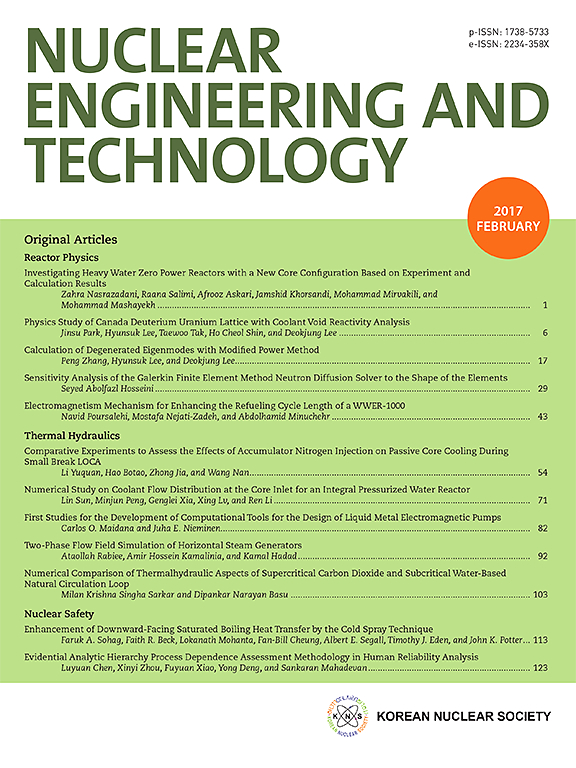Cyclic behaviors of diffusion welded alloy 800H
IF 2.6
3区 工程技术
Q1 NUCLEAR SCIENCE & TECHNOLOGY
引用次数: 0
Abstract
Diffusion welding creates monolithic joints with complex interiors, such as in the printed circuit heat exchanger (PCHE) for high-temperature reactors. PCHEs are mainly subjected to low cycle fatigue, which is caused by thermal contraction and expansion during the start-up/shutdown. To utilize PCHEs in high-temperature reactors, it is essential to understand the cyclic behaviors of the diffusion weldment (DFW). In this study fatigue tests were conducted on Alloy 800H in its as-received (AR) state with the diffusion weldment at 650 °C and 760 °C and a total strain range of 0.5–1.2 %. The heat absorbed during the diffusion welding process softened the DFW, allowing it to accommodate large plastic strains. Fatigue tests revealed that the fatigue life of the DFW was longer than that of the AR where the plastic strain dominates the fatigue life. However, the fatigue life of the DFW was shorter than that of the AR where the materials resisted the cyclic behavior based on their strengths. The location of crack initiation was outside the diffusion welding interface, indicating that the cyclic behaviors of the diffusion weldment depend on the thermal history of the manufacturing process.
扩散焊接合金800H的循环行为
扩散焊产生具有复杂内部结构的整体接头,例如用于高温反应器的印刷电路热交换器(PCHE)。PCHEs主要遭受低周疲劳,这是由启动/关闭期间的热收缩和热膨胀引起的。为了在高温反应器中应用PCHEs,了解扩散焊件(DFW)的循环行为至关重要。在650℃和760℃,总应变范围为0.5 ~ 1.2%的条件下,对合金800H进行了接收态(AR)扩散焊件的疲劳试验。扩散焊接过程中吸收的热量软化了DFW,使其能够适应大的塑性应变。疲劳试验结果表明,塑性应变主导疲劳寿命的DFW比AR的疲劳寿命更长。然而,在材料基于强度抵抗循环行为的情况下,DFW的疲劳寿命比AR短。裂纹起裂位置在扩散焊界面外,表明扩散焊件的循环行为取决于制造过程的热历史。
本文章由计算机程序翻译,如有差异,请以英文原文为准。
求助全文
约1分钟内获得全文
求助全文
来源期刊

Nuclear Engineering and Technology
工程技术-核科学技术
CiteScore
4.80
自引率
7.40%
发文量
431
审稿时长
3.5 months
期刊介绍:
Nuclear Engineering and Technology (NET), an international journal of the Korean Nuclear Society (KNS), publishes peer-reviewed papers on original research, ideas and developments in all areas of the field of nuclear science and technology. NET bimonthly publishes original articles, reviews, and technical notes. The journal is listed in the Science Citation Index Expanded (SCIE) of Thomson Reuters.
NET covers all fields for peaceful utilization of nuclear energy and radiation as follows:
1) Reactor Physics
2) Thermal Hydraulics
3) Nuclear Safety
4) Nuclear I&C
5) Nuclear Physics, Fusion, and Laser Technology
6) Nuclear Fuel Cycle and Radioactive Waste Management
7) Nuclear Fuel and Reactor Materials
8) Radiation Application
9) Radiation Protection
10) Nuclear Structural Analysis and Plant Management & Maintenance
11) Nuclear Policy, Economics, and Human Resource Development
 求助内容:
求助内容: 应助结果提醒方式:
应助结果提醒方式:


